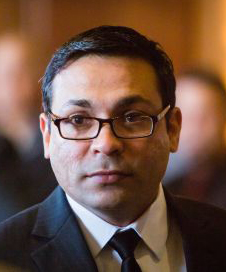Butt, Bilal

Bilal Butt
Dr. Bilal Butt is an associate professor at the University of Michigan with the School of the Environment and Sustainability. He researches violent conflicts that occur over natural resources. Dr. Butt has been honored with many prestigious teaching awards, including the National Science Foundation’s Career Award and the University of Michigan’s Superior Teaching Award. Dr. Butt’s work has been published in many journals, including Remote Sensing of Environment, the Annals of the Association of American Geographers, and the Journal of Applied Ecology and the Humanities.
“Always go to office hours” (2023).
Butt, B. 2022. Doing Environmental Justice: Prospects For Sustainable Engagement. Environment and Planning E: Nature and Space. doi.org/10.1177/25148486221137246
Butt, B. 2020. Digital Data and Knowledge Making in the Field. The Geographical Review 110(1-2): 183-194 doi: 10.1111/gere.12363
Butt, B. 2018. Environmental Indicators and Governance. Current Opinion in Environmental Sustainability 32: 84-89 doi.org/10.1016/j.cosust.2018.05.006
Butt, B. 2016. Neoliberalism, Conservation and Dispossession in Kenya’s Arid Lands. Humanity: An International Journal of Human Rights, Humanitarianism, and Development 7(1): 91-110 doi: 10.1353/hum.2016.0009
Butt, B. 2014. “The Political Ecology of Livestock Incursions into Protected Areas: Technology, Place and Socio-Ecological Dynamics in the Mara Region of Kenya”. Africa: Journal of the International African Institute, 84(4): 614-637 doi:10.1017/S0001972014000515
Dr. Butt was born and raised in Kenya, where he spent much of his time walking, cycling, and driving through its diverse landscapes and interacting with different groups. These experiences growing up laid the seeds for thinking critically about the environment in interdisciplinary ways.
After his undergraduate degree in Geography, he obtained his Master of Arts in Geography from Michigan State University in 2002. He stayed at Michigan State and completed his Ph.D. in Geography, Ethics, and Development in 2007.
Dr. Butt started as a graduate teaching and research assistant at Michigan State University from 2000-2007. He was also a graduate fellow for the International Livestock Research Institute (ILRI) in Nairobi, Kenya, from 2005 to 2007. His Ph.D. research involved putting GPS units on pastoral cattle and ethnographic research to evaluate how pastoralists cope with and adapt to drought in areas around national parks.
After earning his Ph.D., Dr. Butt started a National Science Foundation (NSF) funded postdoctoral research fellowship in 2008 at the University of Wisconsin-Madison. In 2011, he started a second postdoctoral fellowship at the University of Wisconsin-Madison, focusing on geography and GIS. He was also an instructor at the University of Wisconsin-Madison in 2011.
In the fall of 2011, Dr. Bilal began working as an Assistant Professor at the University of Michigan. In 2015, he became a Research Associate at Kenyatta University in Nairobi. While constantly reconciling the ideas and philosophies of the Global North and Global South, he cares deeply about students and mentoring while at the same time placing his research in the lived geographies of people most affected by environmental change. His research concerns the political ecology of environmental resource governance at different spatial scales.
In 2017, Dr. Bilal became an Associate Professor at the University of Michigan’s School for Environment and Sustainability (UM-SEAS). He also has a courtesy appointment in the Department of Afro-American and African Studies at the University of Michigan.
He has been honored with several prestigious teaching awards, including the National Science Foundation’s CAREER Award and the University of Michigan’s Superior Teaching Award. Dr. Butt is published in many journals, including Remote Sensing of Environment, the Annals of the Association of American Geographers, and the Journal of Applied Ecology and the Humanities. Dr. Butt teaches Environmental Security and Conflict, Conservation and Development, Political Ecology, Environmental Governance, and Preparing for International Fieldwork.
Dr. Butt cares deeply for students. He recognizes the generational contributions that have led students to campus and the immense sacrifices that students themselves have had to make to attain access to higher educational spaces, given the persistent inequities. This recognition has meant a teaching style that brings Black, Indigenous, and People of Color perspectives and discourses into the classroom as mainstream environmental knowledge. Through this perspective, he uplifts the voices of the dispossessed, marginalized, subalterns, and those dedicated to presenting those perspectives. As an immigrant, a person of color, and a minority underrepresented scholar, he strives to find ways that these perspectives are taken seriously and move towards improved equity in access to resources that can help students succeed and thrive in their careers.
“Always go to office hours” (2023).
Bilal Butt. n.d. Home [https://www.linkedin.com/in/bilal-butt-umich/]. LinkedIn. Retrieved October 2, 2023 from https://www.linkedin.com/in/bilal-butt-umich/.
Survey and interviews conducted by Justice, Equity, Diversity, and Sustainability Initiative staff. 2022-2023. Yale University-School of the Environment. New Haven, Connecticut.